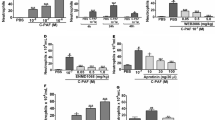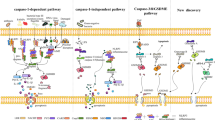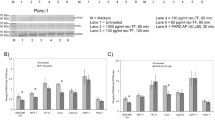Abstract
Recent studies suggest that the action of platelet-activating factor (PAF), a potent phospholipid modulator of allergic and inflammatory reactions, is diverse and functions as a modulator of a variety of physiological and pathological events in many cell types and tissues. Its role (if any) in modulating the proliferation, transformation and/or differentiation of epithelial colonic cells, however, is not known. In this study, we showed that PAF is biologically active in epithelial-derived human colon carcinoma cells with different phenotypic properties. These cells expressed the PAF receptor. PAF activated three prominent mitogen-activated protein kinase modules (ERK, p38MAPK and Jun N-terminal kinases) in these cells, inhibited proliferation and induced differentiation (measured by the induction of Waf1/p21 and the induction of the differentiation-related marker CEA). The net effect of PAF treatment was the suppression of malignant cell behavior (measured by anchorage-independent growth and cellular invasion). It is concluded that PAF is a modulator of proliferation and differentiation in human epithelial-derived colon carcinoma cells.
This is a preview of subscription content, access via your institution
Access options
Subscribe to this journal
Receive 50 print issues and online access
$259.00 per year
only $5.18 per issue
Buy this article
- Purchase on Springer Link
- Instant access to full article PDF
Prices may be subject to local taxes which are calculated during checkout



Similar content being viewed by others
References
Bazan HE and Tao Y . (1997). J. Ocular Pharm. Ther., 13, 277–285.
Brattain MG, Levine AE, Chakrabarty S, Yeoman LC, Willson JKV and Long B . (1984). Cancer Met. Rev., 3, 177–191.
Chakrabarty S, Rajagopal S and Moskal TL . (1998). Lab. Invest., 78, 413–421.
Chakrabarty S, Tobon A, Varani J and Brattain MG . (1988). Cancer Res., 48, 4059–4064.
Di Cunto F, Topley G, Calautti E, Hsiao J, Ong L, Seth PK and Dotto GP . (1998). Science, 280, 1069–1072.
Guadagni F, Witt PL, Robbins PF, Schlom J and Greiner JW . (1990). Cancer Res., 50, 6248–6255.
Honda Z, Takano T, Gotoh Y, Nishida E, Ito K and Shimizu T . (1994). J. Biol. Chem., 269, 2307–2315.
Huang S, Trujillo JM and Chakrabarty S . (1992). Int. J. Cancer, 52, 978–986.
Kume K and Shimizu T . (1997). J. Biol. Chem., 272, 22898–22904.
Kunz D, Gerard NP and Gerard C . (1992) J. Biol. Chem., 267, 9101–9106.
Marques SA, Dy LC, Southall MD, Yi Q, Smietana E, Kapur R, Marques M, Travers JB and Spandau DF . (2002). J. Pharam. Exp. Ther., 300, 1026–1035.
Mukherjee P, DeCoster MA, Campbell FZ, Davis RJ and Bazan NG . (1999). J. Biol. Chem., 274, 6493–6498.
Prescott SM, Zimmerman GA, Stafforini DM and McIntyre TM . (2000). Ann. Rev. Biochem., 69, 419–445.
Reynolds S, Cederberg H and Chakrabarty S . (2000). Clin. Exp. Metastasis, 18, 309–312.
Reynolds S, Rajagopal S and Chakrabarty S . (1998). Cancer Lett., 134, 53–60.
Saito H, Hayakawa T, Mita H, Akiyama K and Shida T . (1992) J. Lipid Mediators, 5, 135–137.
Schaeffer HJ and Weber MJ . (1999). Mol. Cell. Biol., 19, 2435–2444.
Schroy, P . (1994). J. Cell. Physiol., 161, 111–123.
Shimada A, Ota Y, Sugiyama Y, Sato S, Kume K, Shimizu T and Inoue S . (1998). J. Invest. Dermatol., 110, 889–893.
Smith CS and Shearer WT . (1994). Cell. Immunol., 155, 292–303.
Sperber K, Shim J, Mehra M, Lin A, George I, Ogata S, Mayer L and Itzkowitz S . (1998). Inflamm. Bowel Dis., 4, 12–17.
Stoll LL, Yerram NR and Spector AA . (1991). J. Cell Sci., 100, 145–152.
Sugano T, Narashara H, Nasu K, Arima K, Fujisawa K and Miyakawa I . (2001). Mol. Hum. Reproduction, 7, 475–481.
Tokutomi T, Maruiwa H, Hirohata M, Miyagi T and Shigemori M . (2001). Neurol. Res., 23, 605–611.
Wang H, Chakrabarty S . (2001). J. Cell. Physiol., 187, 188–195.
Wang H, Rajagopal S, Reynolds S, Cederberg H and Chakrabarty S . (1999). J. Cell. Physiol., 178, 173–178.
Author information
Authors and Affiliations
Rights and permissions
About this article
Cite this article
Wang, H., Chakrabarty, S. Platelet-activating factor activates mitogen-activated protein kinases, inhibits proliferation, induces differentiation and suppresses the malignant phenotype of human colon carcinoma cells. Oncogene 22, 2186–2191 (2003). https://doi.org/10.1038/sj.onc.1206348
Received:
Revised:
Accepted:
Published:
Issue Date:
DOI: https://doi.org/10.1038/sj.onc.1206348
Keywords
This article is cited by
-
Regulation of platelet-activating factor-induced interleukin-8 expression by protein tyrosine phosphatase 1B
Cell Communication and Signaling (2019)
-
The application of ApcMin/+ mouse model in colorectal tumor researches
Journal of Cancer Research and Clinical Oncology (2019)
-
Platelet-activating factor induces cell cycle arrest and disrupts the DNA damage response in mast cells
Cell Death & Disease (2015)
-
Global gene expression analysis in time series following N-acetyl L-cysteine induced epithelial differentiation of human normal and cancer cells in vitro
BMC Cancer (2005)
-
The Role of Arachidonic Acid Regulatory Enzymes in Colorectal Disease
Diseases of the Colon & Rectum (2005)



